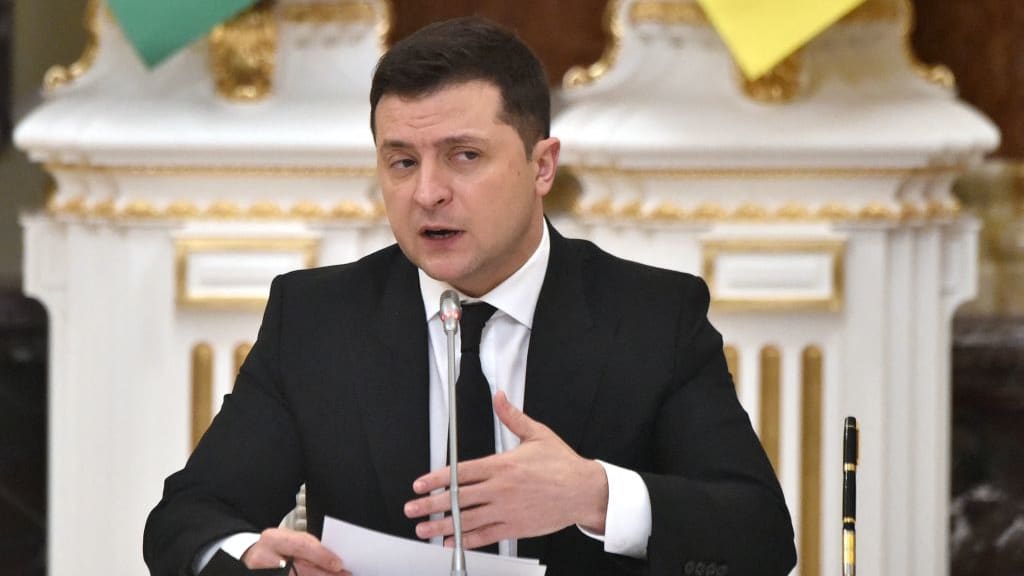Amid tensions with Russia, bipartisan Senate delegation travels to Ukraine to meet leaders


A free daily email with the biggest news stories of the day – and the best features from TheWeek.com
You are now subscribed
Your newsletter sign-up was successful
With the Biden administration and lawmakers becoming more and more concerned that Russia might be preparing to invade Ukraine, a seven-member delegation of U.S. senators traveled to Kyiv, where they met with Ukrainian President Volodymyr Zelensky and other top officials on Monday.
"Our bipartisan congressional delegation sends a clear message to the global community: The United States stands in unwavering support of our Ukrainian partners to defend their sovereignty and in the face of persistent Russian aggression," Sen. Jeanne Shaheen (D-N.H.) said. Her sentiment was echoed by Sen. Rob Portman (R-Ohio), who said that Ukraine is defending its "territorial integrity against an increasingly aggressive Russia while also striving to enact critical domestic reforms to solidify its democracy," making U.S. support "more important than ever."
Shaheen and Portman were joined in Kyiv by Sen. Richard Blumenthal (D-Conn.), Sen. Kevin Cramer (R-N.D.), Sen. Amy Klobuchar (D-Minn.), Sen. Chris Murphy (D-Conn.), and Sen. Roger Wicker (R-Miss.). They met with Ukraine's interior, foreign, and defense ministers, their teams, and energy executives, with Murphy telling reporters the senators stressed that the U.S. will keep providing "the defensive weapons systems that they need."
The Week
Escape your echo chamber. Get the facts behind the news, plus analysis from multiple perspectives.

Sign up for The Week's Free Newsletters
From our morning news briefing to a weekly Good News Newsletter, get the best of The Week delivered directly to your inbox.
From our morning news briefing to a weekly Good News Newsletter, get the best of The Week delivered directly to your inbox.
Over the last year, Russia has been shifting its troops, and in the last several months an estimated 100,000 have made their way to the border near eastern Ukraine. The White House has warned that Russian operatives are now in eastern Ukraine, possibly preparing for a false-flag attack that would trigger an invasion by Russia. Moscow has said it has no intention of entering Ukraine, but wants the NATO alliance to stop expanding eastward.
Last week, Senate Democrats introduced legislation that would impose sanctions on Russian President Vladimir Putin, several government and military officials, and banking institutions should an invasion take place.
A free daily email with the biggest news stories of the day – and the best features from TheWeek.com
Catherine Garcia has worked as a senior writer at The Week since 2014. Her writing and reporting have appeared in Entertainment Weekly, The New York Times, Wirecutter, NBC News and "The Book of Jezebel," among others. She's a graduate of the University of Redlands and the Columbia University Graduate School of Journalism.
-
 Why is the Trump administration talking about ‘Western civilization’?
Why is the Trump administration talking about ‘Western civilization’?Talking Points Rubio says Europe, US bonded by religion and ancestry
-
 Quentin Deranque: a student’s death energizes the French far right
Quentin Deranque: a student’s death energizes the French far rightIN THE SPOTLIGHT Reactions to the violent killing of an ultraconservative activist offer a glimpse at the culture wars roiling France ahead of next year’s elections
-
 Secured vs. unsecured loans: how do they differ and which is better?
Secured vs. unsecured loans: how do they differ and which is better?the explainer They are distinguished by the level of risk and the inclusion of collateral
-
 Britain’s ex-Prince Andrew arrested over Epstein ties
Britain’s ex-Prince Andrew arrested over Epstein tiesSpeed Read The younger brother of King Charles III has not yet been charged
-
 Ex-South Korean leader gets life sentence for insurrection
Ex-South Korean leader gets life sentence for insurrectionSpeed Read South Korean President Yoon Suk Yeol was sentenced to life in prison over his declaration of martial law in 2024
-
 Putin’s shadow war
Putin’s shadow warFeature The Kremlin is waging a campaign of sabotage and subversion against Ukraine’s allies in the West
-
 Rubio boosts Orbán ahead of Hungary election
Rubio boosts Orbán ahead of Hungary electionSpeed Read Far-right nationalist Prime Minister Viktor Orbán is facing a tough re-election fight after many years in power
-
 Alexei Navalny and Russia’s history of poisonings
Alexei Navalny and Russia’s history of poisoningsThe Explainer ‘Precise’ and ‘deniable’, the Kremlin’s use of poison to silence critics has become a ’geopolitical signature flourish’
-
 Key Bangladesh election returns old guard to power
Key Bangladesh election returns old guard to powerSpeed Read The Bangladesh Nationalist Party claimed a decisive victory
-
 US, Russia restart military dialogue as treaty ends
US, Russia restart military dialogue as treaty endsSpeed Read New START was the last remaining nuclear arms treaty between the countries
-
 What happens now that the US-Russia nuclear treaty is expiring?
What happens now that the US-Russia nuclear treaty is expiring?TODAY’S BIG QUESTION Weapons experts worry that the end of the New START treaty marks the beginning of a 21st-century atomic arms race
